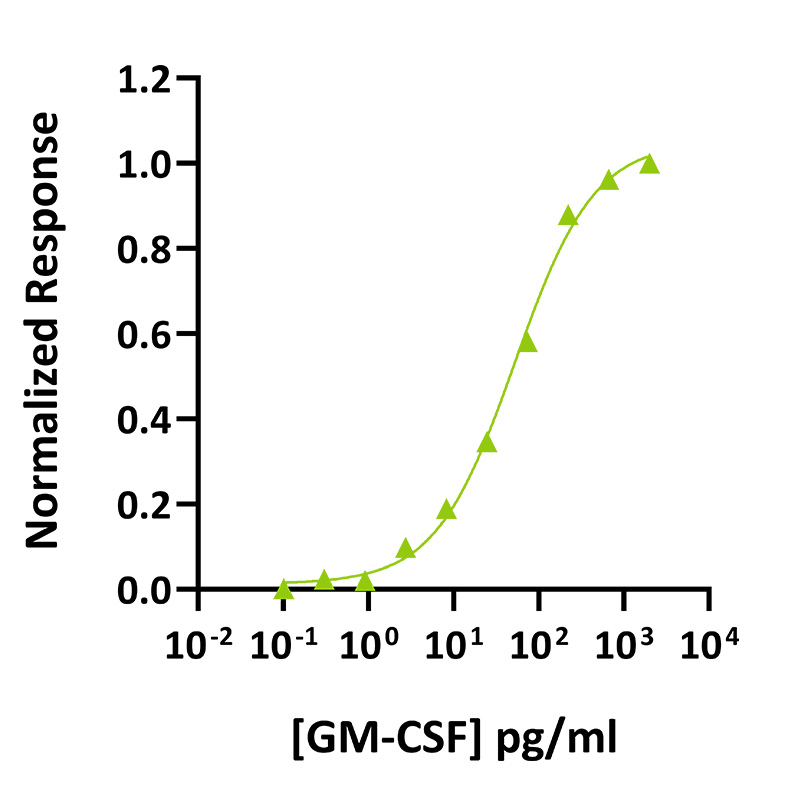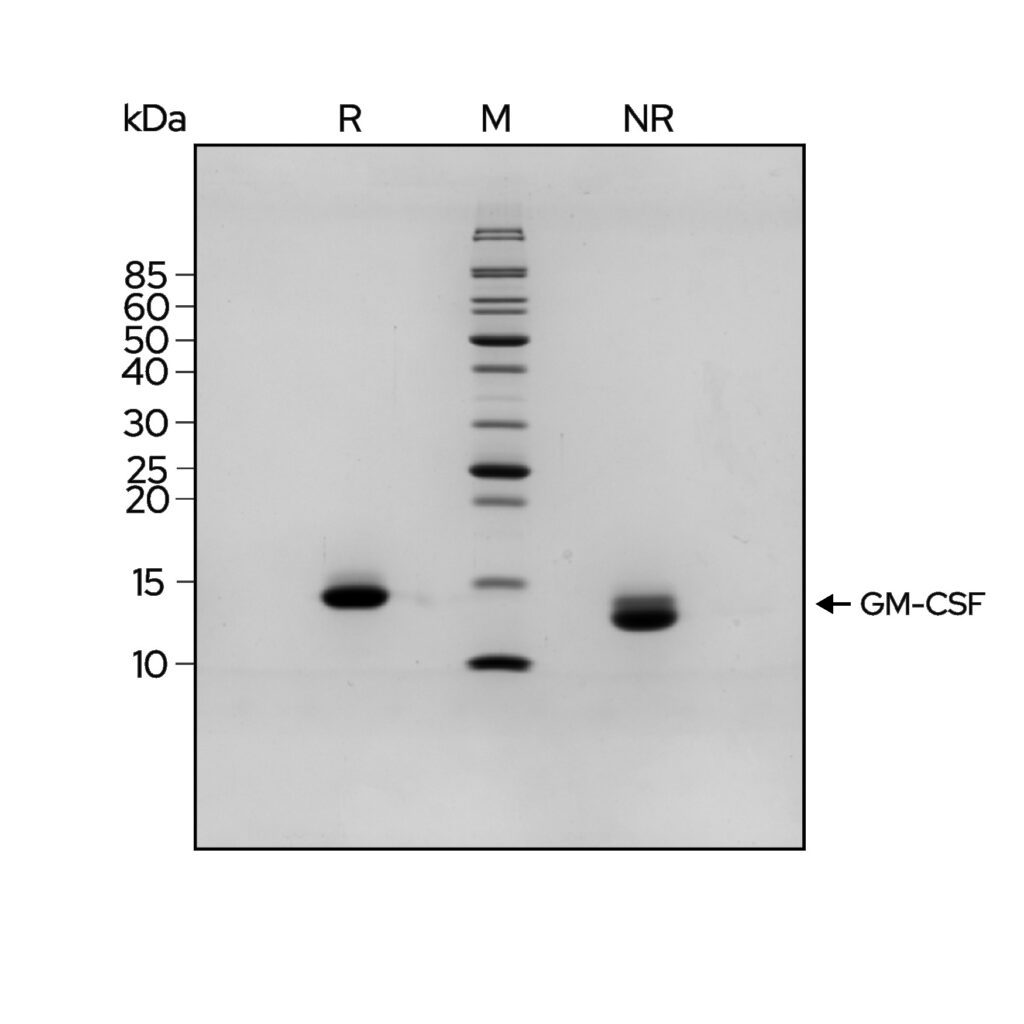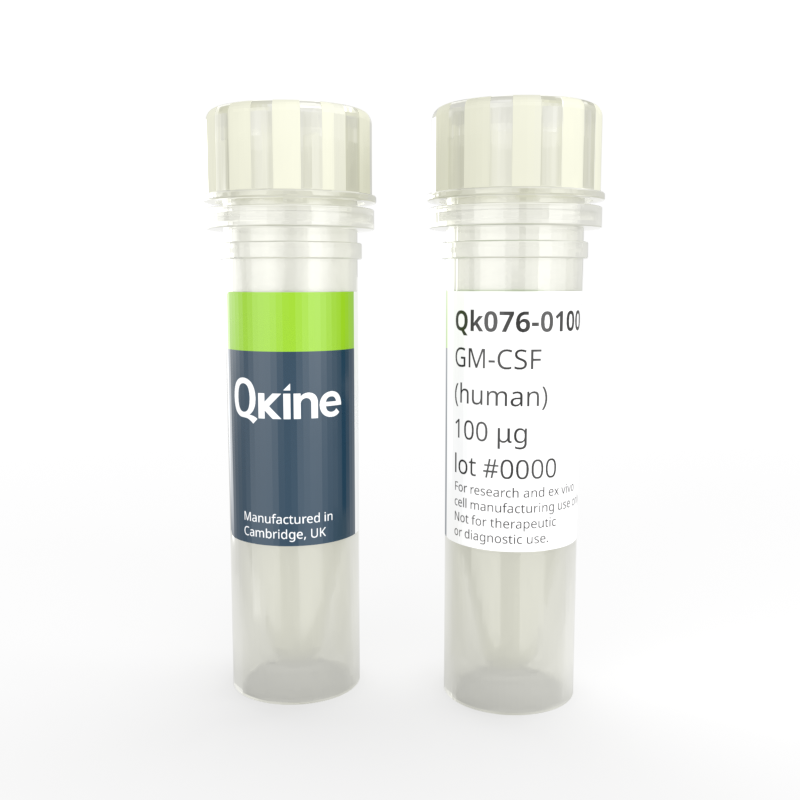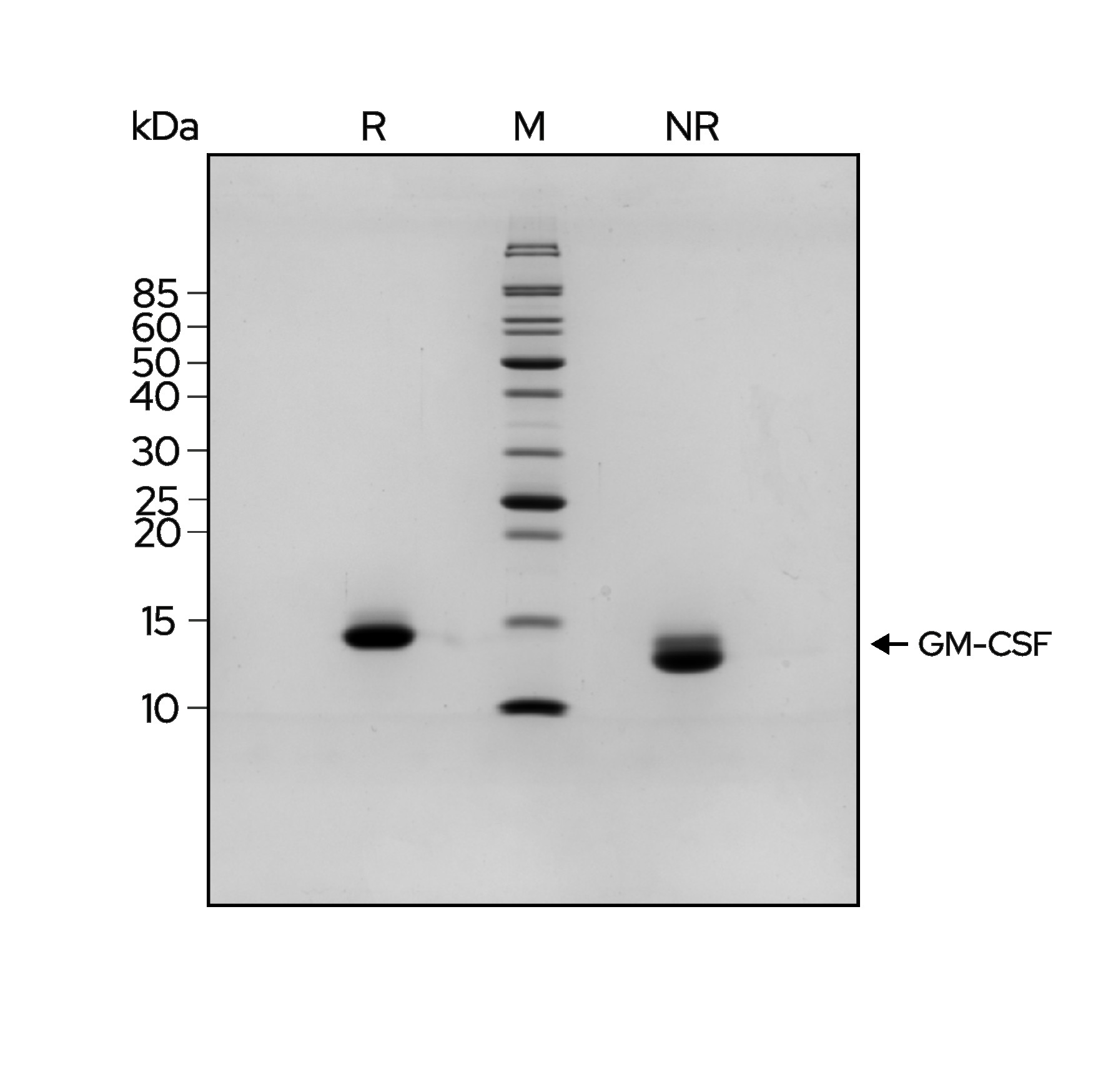 Recombinant human GM-CSF protein (Qk076)
Recombinant human GM-CSF protein (Qk076)Recombinant human GM-CSF protein (Qk076)
Price range: £230.00 through £2,900.00
Granulocyte-macrophage colony-stimulating factor (GM-CSF) is a hematopoietic growth factor involved in the differentiation and activation of monocytes such as macrophages and dendritic cells, and granulocytes such as neutrophils, eosinophils, and basophils. GM-CSF is commonly used in cell culture to stimulate the differentiation and maturation of human-induced pluripotent stem cells or peripheral blood monocytes to myeloid cells.
Qkine human GM-CSF is composed of 144 amino acids with a molecular weight of 14.6 kDa. This protein is animal origin-free, carrier protein-free, tag-free, and non-glycosylated to ensure a homogenous population with exceptional lot-to-lot consistency. Qk076 is suitable for reproducible and high-quality neutrophils and other relevant cell cultures.
In stock
Orders are typically shipped same or next day (except Friday).
Easy world-wide ordering, direct or through our distributors.
Price range: £230.00 through £2,900.00
Buy online with secure credit card or purchase order. For any questions, please email orders@qkine.com
Summary:
- High purity human protein (Uniprot number: P04141)
- 14.6 kDa (monomer)
>98%, by SDS-PAGE quantitative densitometry
Expressed in E. coli
Animal origin-free (AOF) and carrier protein-free
Manufactured in our Cambridge, UK laboratories
Lyophilized from acetonitrile, TFA
- Resuspend in sterile-filtered water at >50 µg/ml, add carrier protein if desired, prepare single use aliquots and store frozen at -20 °C (short-term) or -80 °C (long-term).
Featured applications:
Asymmetric stem cell self-renewal in human keratinocytes
Differentiation of peripheral blood monocytes to myeloid lineages
Differentiation of stem cells into erythrocytes and megakaryocytes
Generation of immature dendritic cells
Generation of iPSC-derived granulocytes
Polarization of macrophages
- Recombinant human Flt3L protein (Qk087)
- Recombinant human M-CSF protein (Qk075)
- Recombinant human TGF-β1 PLUS™ protein (Qk010)
- Recombinant human IFN-gamma protein (Qk117)
- Recombinant human IL-3 protein (Qk090)
- Recombinant human IL-4 protein (Qk092)
- Recombinant human IL-7 protein (Qk095)
- Recombinant human IL-15 protein (Qk097)
- Recombinant human IL-8 protein (Qk119)
- Recombinant human IL-34 PLUS™ protein (Qk091)

GM-CSF activity was determined using proliferation of TF-1 human myeloid leukemia cells. Cells were treated in triplicate with a serial dilution of GM-CSF for 48 hours. Cell viability was measured using the CellTiter-Glo (Promega) luminescence assay. EC50 = 52.5 ng/ml (3.6 nM). Data from Qk076 lot #204525.
Recombinant GM-CSF migrates as a major band at approximately 14.6 kDa in non-reducing (NR) ad reduced (R) conditions. No contaminating protein bands are present. The purified recombinant protein (3 µg) was resolved using 15% w/v SDS-PAGE in reduced (+β-mercaptoethanol, R) and non-reduced conditions and stained with Coomassie Brilliant Blue R250. Data from Qk076 batch #204525.

Further quality assays
Mass spectrometry: single species with expected mass
Recovery from stock vial: >95%
Endotoxin: <0.005 EU/μg protein (below level of detection)
We are a company founded and run by scientists to provide a service and support innovation in stem cell biology and regenerative medicine. All our products are exceptionally high purity, with complete characterisation and bioactivity analysis on every lot.

Qkine GM-CSF is as biologically active as the comparable alternative supplier protein. Stimulation of proliferation of TF-1 cells with Qkine GM-CSF (Qk076, green) and alternative supplier GM-CSF (Supplier B, black). Cells were treated in triplicate with a serial dilution of GM-CSF for 48 hours and proliferation measured using the CellTiter-Glo (Promega) luminescence assay.
Technote | GM-CSF (Qk076) bioactivityTechnote | GM-CSF (Qk076) stabilityProtein background
Granulocyte-macrophage colony-stimulating factor (GM-CSF), or colony-stimulating factor 2 (CSF-2), is a secreted glycoprotein belonging to the hematopoietic family of growth factors. GM-CSF induces the development of myeloid, erythroid, and megakaryocytic cell lineages[1-4]. It plays a crucial role in the survival and recruitment of myeloid cells to inflammation sites and is also involved in regulating T-cell function [1,3,5-7]. Its role in the differentiation and proliferation of myeloid progenitors towards macrophages and dendritic cells was first identified, followed by its role as a cytokine during inflammation [1,3,5,6]. Other growth factors involved in monocyte/macrophage regulation include M-CSF and IFN-γ [8,9].
GM-CSF is a monomer composed of 144 amino acids with a molecular weight of approximately 14.6 kDa [10]. It is produced by various cells including activated T cells, B cells, macrophages, monocytes, mast cells, vascular endothelial cells, and fibroblasts [1,11]. GM-CSF binds to the GM-CSF receptor (GM-CSFR or CSF2R) expressed by myeloid cells and some non-hematopoietic cells [1,12]. This receptor is not present in lymphoid cells. GM-CSFR is composed of an α chain and β chain. The ternary complex of GM-CSF to GM-CSFR assembles into a dodecamer or higher-order complex and activates the downstream signaling pathways: JAK2/ STAT5, Ras/ ERK, NF-κB, and PI3K pathways [1,7].
GM-CSF is commonly used in cell culture with FGF-2 to stimulate the differentiation and maturation of human-induced pluripotent stem cells or peripheral blood monocytes to myeloid cells [13-15]. Myeloid cells include monocytes such as macrophages and dendritic cells, and granulocytes such as neutrophils, eosinophils, and basophils. The differentiation into macrophages is commonly performed using media supplemented with GM-CSF or M-CSF. GM-CSF and M-CSF can increase the glycolytic activity of macrophages, as well as influence their polarization and shape [16-19]. GM-CSF, along with Lipopolysaccharide and IFN-γ, favor an M1-polarized macrophage of a “fried-egg” shape [19-22]. In the case of dendritic cells, GM-CSF and IL-4 can generate immature dendric cells [23,24]. Further maturation is achieved using a mixture of IL-1β, IL-6, TNF-α, PGE2, and IL-10 [24]. Finally, GM-CSF is used as a growth factor to differentiate stem cells into erythrocytes and megakaryocytes with IL-3 as well as to stimulate and promote the self-renewal of keratinocytes [4,25,26].
GM-CSF is involved in the pathogenesis of several inflammatory and immune disorders such as asthma, rheumatoid arthritis, and multiple sclerosis [1,27-29]. As such, several preclinical models and clinical models have evaluated that GM-CSF may be a viable therapeutic target [2,30]. GM-CSF-based vaccines have been shown to enhance the immune response to vaccines by promoting the maturation and activation of dendritic cells in preclinical models [31]. GM-CSF has also been approved for patients with cancer undergoing chemotherapy as well as for bone marrow transplantation to stimulate the production of myeloid cells. However, further insights are needed on GM-CSF pro-tumorigenic effects to harness its therapeutic potential [32,33]. Finally, due to its role in embryonic development, GM-CSF has been proposed as a culture media supplement for in vitro fertilization where its potential and effectiveness will be confirmed with more randomized controlled trials [34].
Additional resources
Our products are for research use only and not for diagnostic or therapeutic use. Products are not for resale.
For use in manufacturing of cellular or gene therapy products. Not intended for in vivo applications.

Receive an Amazon gift voucher when you leave us a review.
£25, $30 or €30 for reviews with an image and £10, $15 or €15 for reviews without an image

